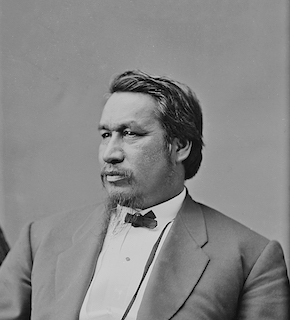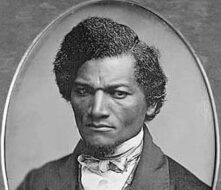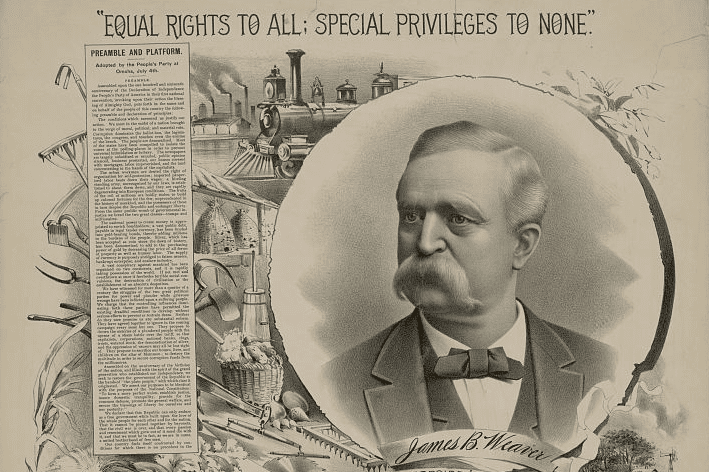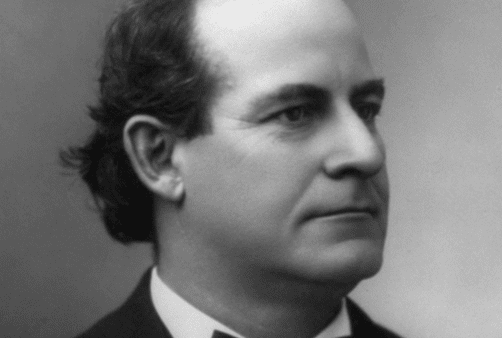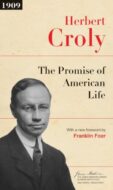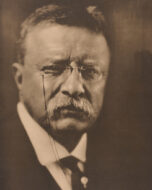Introduction
Ely Parker (1828–1895), a Seneca chief and descendant of Red Jacket, studied law as a young man but was prevented from taking the New York bar exam because he was not an American citizen. Instead, he worked as an engineer.
During the Civil War, Parker served as adjutant (secretary) to General Ulysses S. Grant (1822–1885). In this capacity he drafted the surrender document General Robert E. Lee signed at Appomattox. When Grant became president in 1869, he chose Parker to be Commissioner of Indian Affairs, the first Native to be hold that post. Together, the two forged what became known as Grant’s Peace Policy toward Indians. Pursuant to that policy, reservations were transferred from the War Department to Christian missionaries. Parker’s attempts to root out corruption in Indian affairs ran into powerful opposition, however. Accused of corruption himself (he was later exonerated), he was forced to resign in 1871. Years later, he explained his position in a letter to Harriet Converse, who was a defender of Seneca rights, and a friend of Parker’s.
—Jace Weaver
For many years I was a constant visitor at the state and federal capitals either seeking legislative relief or in attendance at state and federal courts. Being only a mere lad, the pale-faced officials with whom I came in contact flattered me and declared that one so young must be extraordinarily endowed to be charged with the conduct of such weighty affairs. I pleased my people in eventually bringing their troubles to a successful and satisfactory termination. I prepared and had approved by the proper authorities a code of laws and rules for the conduct of affairs among themselves and settled them for all time, or for so long as Hawenneyo1 should let them live. . . .
. . .The War of the Rebellion had broken out among the pale-faces, a terrible contest between the slaveholding and non-slaveholding sections of the United States. I had, through the Hon. Wm. H. Seward,2 personally tendered my services for the non-slaveholding interest. Mr. Seward in short said to me that the struggle in which I wished to assist was an affair between white men and one in which the Indian was not called on to act. “The fight must be made and settled by the white men alone,” he said. “Go home, cultivate your farm, and we will settle our own troubles without any Indian aid.”
I did go home and planted crops and myself on the farm, sometimes not leaving it for four and six weeks at a time. But the quarrel of the whites was not so easily or quickly settled. It was not a wrangle of boys but a struggle of giants, and the country was being racked to its very foundations.
Then came to me in my forest home a paper bearing the great red seal of the War Department at Washington. It was an officer’s commission in the Army of the United States. . . .
I went from the east to the west and from the west to the east again. They heard of me in great battles and they knew of my association with the great commander of all the Union armies and how I upheld the right arm of his strength, and they said, “How great and powerful is our chief!”
The quarrel between the white men ended. The great commander with his military family settled in Washington, where the great council fire of his nation was annually lighted and blazed in all its glory and fury. As a humble member of this military family I was the envy of many a pale-faced subordinate embryo-general who said in whisper, “Parker must be a genius, he is so great and powerful.”
In a few years my military chieftain was made head and front of the whole American people, and in his partiality he placed me at the head of the management of the Indian affairs of the United States. I was myself an Indian and presumably understood them, their wants, and the manipulation of their affairs generally. Then again went out among the whites and Indians the words, “Parker must be a genius, he is so great and powerful.” The Indians were universally pleased, and they were all willing to be quiet and remain at peace, and were even asking to be taught civilization and Christianity. I put an end to all wars either among themselves or with their white brothers, and I sent professed Christian whites who waxed rich and fat from the plundering of the poor Indians, nor were there teacherships enough to give places to all the hungry and impecunious Christians. Then was the cry raised by all who believed themselves injured or unprovided for, “Nay, this Parker is an Indian genius; he is grown too great and powerful; he doth injure our business and take the bread from the mouths of our families and the money from out of our pockets; now, therefore, let us write and put him out of power, so that we may feast as heretofore.”
They made their onslaught on my poor innocent head and made the air foul with their malicious and poisonous accusations. They were defeated, but it was no longer a pleasure to discharge patriotic duties in the face of foul slander and abuse. I gave up a thankless position to enjoy my declining days in peace and quiet. . . .
Ely S. Parker, Seneca-Iroquois


